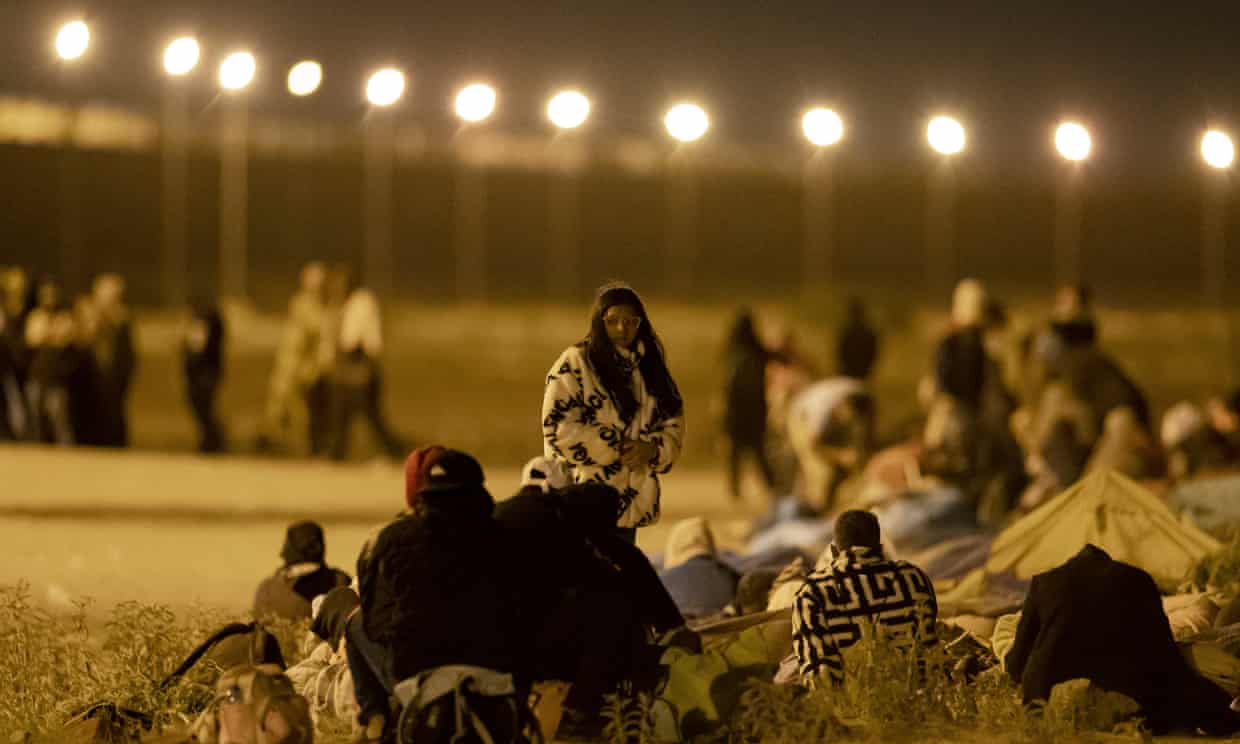The US was set to lift tough restrictions at the US-Mexico border, known as Title 42, on Thursday night. The major policy shift comes as tens of thousands are stuck in harsh conditions in northern Mexico or risk life and liberty to enter America unlawfully, straining local communities and intensifying political divisions.
An immigration policy is set to end. What will it mean for US’s commitment as a land of refuge?
Read more
The right to claim asylum in the US has been blocked for many fleeing political and economic crises, especially from Central and South American countries, the Caribbean and parts of Africa.
Donald Trump, an anti-immigration hardliner, implemented the Title 42 public health rule in 2020 when the pandemic hit, but it was continued and even expanded by Joe Biden, despite campaign promises of a fairer and more humane system at the border. The policy has faced court battles and criticism from left and right.
The number of people apprehended by federal agents after crossing the border into the US without permission has fluctuated for years, but has been climbing again in recent weeks, surpassing 10,000 on Monday and Tuesday along the 2,000-mile line with Mexico. Under Title 42, many are summarily expelled from the US without being given the chance even to request asylum.
When Title 42 lifts, migrants will be allowed to request refuge again when they approach official border ports of entry – but the Biden administration plans to speed up initial interviews by agents to decide who has a case to take to court, prompting immigrant advocates to complain that a rushed process will be unfair.
The administration has also implemented an aggressive new regulation that will deny asylum to almost all migrants who cross illegally. The new measure will take effect when Title 42 lifts, coinciding with the end of the broad government declaration that the US is in a Covid-19 public health emergency.
A Peruvian family at the border in Yuma, Arizona on Thursday.
A Peruvian family at the border in Yuma, Arizona on Thursday. Photograph: Mario Tama/Getty Images
There are fears of fresh chaos and confusion and misery for migrants at the mercy of complex policies – on paper or in the various ways they are implemented on the ground.
Homeland security secretary Alejandro Mayorkas said the new rule would mean tougher consequences for migrants crossing illegally, who could be deported and barred from the US for five years if they do not qualify for asylum.
On Wednesday, Mayorkas also touted “the largest expansion of lawful pathways ever” for people to apply to enter the US, but those are still strictly limited, and he paired his language with firm rhetoric, saying, “The lifting of Title 42 does not mean our border is open, in fact, it’s the contrary” and promised “tougher consequences” for irregular migration across the border than before.
He warned migrants: “Don’t risk your life and your life savings … do not listen to the [human] smugglers’ lies – you will be returned … we are a nation of immigrants but we are also a nation of laws.”
Republicans fault Biden and have made immigration a big topic in recent elections, with right-wingers continuing to use Trump’s language as president and talk of migrants as “an invasion”.
Biden administration officials have escalated attacks on Republicans, saying they failed to fix immigration laws or provide adequate border funds, while refusing to pass legislation giving more orderly routes to eligibility for US citizenship.
“I asked the Congress for a lot more money for the border patrol,” Biden told reporters on Wednesday. “They didn’t do it.”
The Republican-controlled House of Representatives was aiming to pass a hardline bill on Thursday that would further toughen border security and restrict access to asylum, but it has little chance in the Senate.
Since Biden took office in January 2021, the country has seen migrants apprehended a record 4.6m times at the southern border.
A Reuters/Ipsos poll released this week showed that only 26% approved of Biden’s handling of immigration.
In Texas, the Republican governor, Greg Abbott, a fierce critic of Biden’s border policies, expanded an ongoing national guard deployment this week “to help intercept and repel large groups of migrants trying to enter Texas illegally”, despite immigration enforcement being the purview of the federal government.
Migrants at the border near San Diego on Thursday.
Migrants at the border near San Diego on Thursday. Photograph: Mike Blake/Reuters
Abbott declared “great work” as he retweeted a tweet on Wednesday that showed a video clip of state troops behind loops of razor wire blocking people scrambling up a muddy bank from the Rio Grande that marks the Texas border, despite many of them carrying tiny children and others waiting up to their waist in a river that has claimed many migrant lives.
With the Biden administration saying it will toughen enforcement, some migrants have scrambled to cross while Title 42 remains in effect.
Hundreds in San Diego, including many small children, have been stuck in a no man’s land between two tall border walls, often for days, as they wait to be processed by overwhelmed border agents.
On Wednesday, volunteers on the US side passed sandwiches through gaps in the wall and said conditions were “squalid”.
Earlier this week, eight mn believed to be from Venezuela were killed and 10 others badly injured when a local resident in Brownsville, where the border reaches the Gulf of Mexico, crashed a car into migrants waiting at a bus stop while, according to several witnesses, shouting anti-immigrant curses.
In March, 49 people were killed in a migrant border detention center in Ciudad Juarez, Mexico, when they were trapped behind locked doors in a fire.




